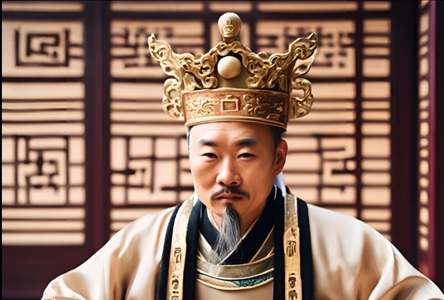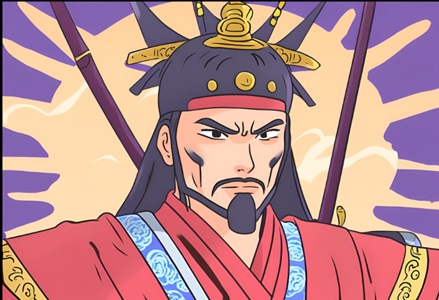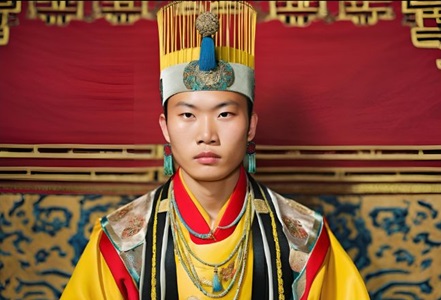Title of Biography in Chinese, Pinyin: 周武王传 (Jī Fā Zhuàn).
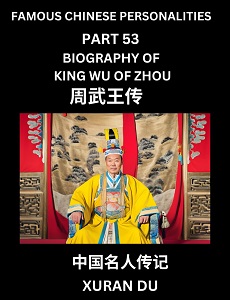
Title of Biography in English: The Biography of King Wu of Zhou, Ji Fa.
Check out books on my Amazon and Barnes & Noble homepages as well as the following pages to learn Biographies of famous Chinese personalities-
- Part 1 – Chinese Biography Book Series for Beginners
- Part 2 – Chinese Biography Book Series for Beginners
- Part 3 – Chinese Biography Book Series for Beginners
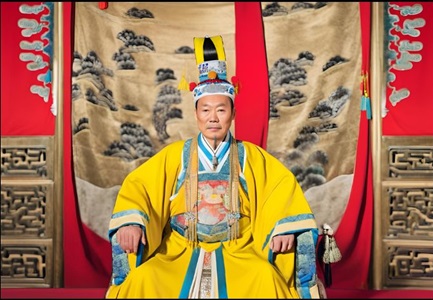
The Biography of King Wu of Zhou in English (英文传记)
The Biography of King Wu of Zhou, Ji Fa
King Wu of Zhou, Ji Fa, a prominent leader of the Zhou tribe during the late Shang Dynasty, successfully overthrew the tyrannical reign of King Zhou of Shang with his outstanding military prowess and far-sighted strategies, ushering in the eight-hundred-year golden age of the Zhou Dynasty. As the son of King Wen of Zhou, Ji Fa, also known as Fa, demonstrated exceptional wisdom and courage from a young age, deeply beloved by his father and the clan.

Early Life: Under the guidance of his father, King Wen, Ji Fa not only mastered the art of governance but also excelled in military strategies. Recognizing the importance of popular support, he actively promoted benevolent policies, earning widespread admiration and support.
Rise to Power and Conquest: Facing the brutal rule of King Zhou, Ji Fa, adhering to the will of heaven and the people, united various vassal states and achieved a decisive victory at the Battle of Muye, leading to the downfall of the Shang Dynasty and the self-immolation of King Zhou. This battle not only showcased Ji Fa’s brilliant military command but also marked a new era in history.
Founding the Zhou Dynasty: After defeating the Shang, Ji Fa established the Zhou Dynasty, with its capital at Haojing (near present-day Xi’an), known as the Western Zhou Dynasty. He implemented the feudal system, granting lands and titles to nobles and relatives, forming a vast political structure centered around the royal family, effectively consolidating the foundation of Zhou’s rule.
Governance: In administering the country, King Wu inherited and developed his father’s philosophy of benevolent governance, focusing on agricultural development, alleviating the burden on the people, and strengthening the legal system to maintain social order. His initiatives led to social stability, economic prosperity, and cultural flourishing in the early Zhou Dynasty.
Learn Biography Of King Wu of Zhou in Chinese (中文传记)

周武王姬发,作为商朝末年周部落的杰出领袖,以其卓越的军事才能和深谋远虑,成功推翻了商纣王的暴政,开启了周朝八百年的辉煌历史。姬发,字发,是周文王姬昌之子,自幼便展现出非凡的智慧与勇气,深受父王及族人的爱戴。
早年经历: 在其父姬昌的悉心教导下,姬发不仅精通治国之道,更擅长兵法战略。他深知民心向背的重要性,积极推行仁政,赢得了广泛的支持与赞誉。
起兵伐纣: 面对商纣王的残暴统治,姬发顺应天意民心,联合各诸侯国,于牧野之战中大败商军,纣王自焚而死,商朝灭亡。此役不仅展现了姬发卓越的军事指挥能力,也标志着历史进入了一个新的纪元。
建立周朝: 灭商之后,姬发建立周朝,定都镐京(今西安附近),史称西周。他推行分封制,将宗室及功臣分封至各地,形成了以周王室为中心的庞大政治体系,有效巩固了周朝的统治基础。
治理国家: 在治国理政上,姬发继承并发展了其父的仁政思想,注重发展农业,减轻百姓负担,同时加强法制建设,维护社会秩序。他的一系列举措,使得周朝初期社会稳定,经济繁荣,文化昌盛。
King Wu of Zhou Biography Keywords- English, Chinese & Pinyin (关键词)

- 姬发(Jī Fā): Founder and King of Zhou Dynasty
- 牧野之战(Mù Yě Zhī Zhàn): Battle of Muye, decisive victory that ended the Shang Dynasty
- 分封制(Fēn Fēng Zhì): Feudal System, a political system of granting lands and titles to nobles
- 仁政(Rén Zhèng): Benevolent Governance, emphasizing kindness and justice in ruling
- 镐京(Hào Jīng): Capital of the Western Zhou Dynasty, located near modern Xi’an
Pinyin of King Wu of Zhou Biography (周武王传记的拼音)

Zhōu wǔwángjī fā, zuòwéi shāng cháo mònián zhōu bùluò de jiéchū lǐngxiù, yǐ qí zhuóyuè de jūnshì cáinéng hé shēnmóuyuǎnlǜ, chénggōng tuīfānle shāng zhòu wáng de bàozhèng, kāiqǐle zhōu cháo bābǎi nián de huīhuáng lìshǐ. Jī fā, zì fā, shì zhōuwén wáng jī chāng zhīzǐ, zì yòu biàn zhǎnxiàn chū fēifán de zhìhuì yǔ yǒngqì, shēn shòu fù wáng jí zúrén de àidài.
Zǎonián jīnglì: Zài qí fù jī chāng de xīxīn jiàodǎo xià, jī fǎ bùjǐn jīngtōng zhìguó zhī dào, gèng shàncháng bīngfǎ zhànlüè. Tā shēn zhī mínxīn xiàngbèi de zhòngyào xìng, jījí tuīxíng rénzhèng, yíngdéle guǎngfàn de zhīchí yǔ zànyù.
Qǐbīng fá zhòu: Miàn duì shāng zhòu wáng de cánbào tǒngzhì, jī fā shùnyìng tiānyì mínxīn, liánhé gè zhūhóu guó, yú mùyě zhī zhàn zhōng dà bài shāng jūn, zhòu wáng zìfén ér sǐ, shāng cháo mièwáng. Cǐ yì bùjǐn zhǎnxiànle jī fā zhuóyuè de jūnshì zhǐhuī nénglì, yě biāozhìzhe lìshǐ jìnrùle yīgè xīn de jìyuán.
Jiànlì zhōu cháo: Miè shāng zhīhòu, jī fā jiànlì zhōu cháo, dìng dū gǎo jīng (jīn xī’ān fùjìn), shǐ chēng xīzhōu. Tā tuī háng fēnfēng zhì, jiāng zōngshì jí gōngchén fēnfēng zhì gèdì, xíngchéngle yǐ zhōu wángshì wéi zhōngxīn de pángdà zhèngzhì tǐxì, yǒuxiào gǒnggùle zhōu cháo de tǒngzhì jīchǔ.

Zhìlǐ guójiā: Zài zhìguó lǐ zhèng shàng, jī fā jìchéng bìng fāzhǎnle qí fù de rénzhèng sīxiǎng, zhù chóng fāzhǎn nóngyè, jiǎnqīng bǎixìng fùdān, tóngshí jiāqiáng fǎzhì jiànshè, wéihù shèhuì zhìxù. Tā de yī xìliè jǔcuò, shǐdé zhōu cháo chūqí shèhuì wěndìng, jīngjì fánróng, wénhuà chāngshèng.
